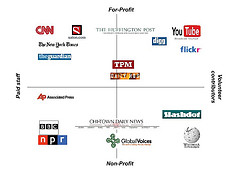These are the glory days of American journalism. Never before have we had access to the variety and depth of information we have now, and never with such immediate availability. So says Matthew Yglesias of Slate in a post debunking any notion that the struggles of print media reflect a larger cancer growing in the heart of the field.
His piece comes in the wake of Pew’s latest State of the Media Report, which he says “makes no mention of the Web’s speed, range, and depth, or indeed any mention at all of audience access to information as an important indicator of the health of journalism.”
He writes: “[The Pew results are] a blinkered outlook that confuses the interests of producers with those of consumers, confuses inputs with outputs, and neglects the single most important driver of human welfare—productivity. Just as a tiny number of farmers now produce an agricultural bounty that would have amazed our ancestors, today’s readers have access to far more high-quality coverage than they have time to read.”
Yglesias takes us through his rich process of reading up on current events, showing how readers can build on breaking news by following links and recommendations towards in-depth features and even books written on the subject. Digital media also allows journalists more tools for crafting stories and presenting complex information at a much quicker pace.
“In other words, any individual journalist working today can produce much more than our predecessors could in 1978. And the audience can essentially read all of our output. Not just today’s output either. Yesterday’s and last week’s and last month’s and last year’s and so forth. To the extent that the industry is suffering, it’s suffering from a crisis of productivity.”









